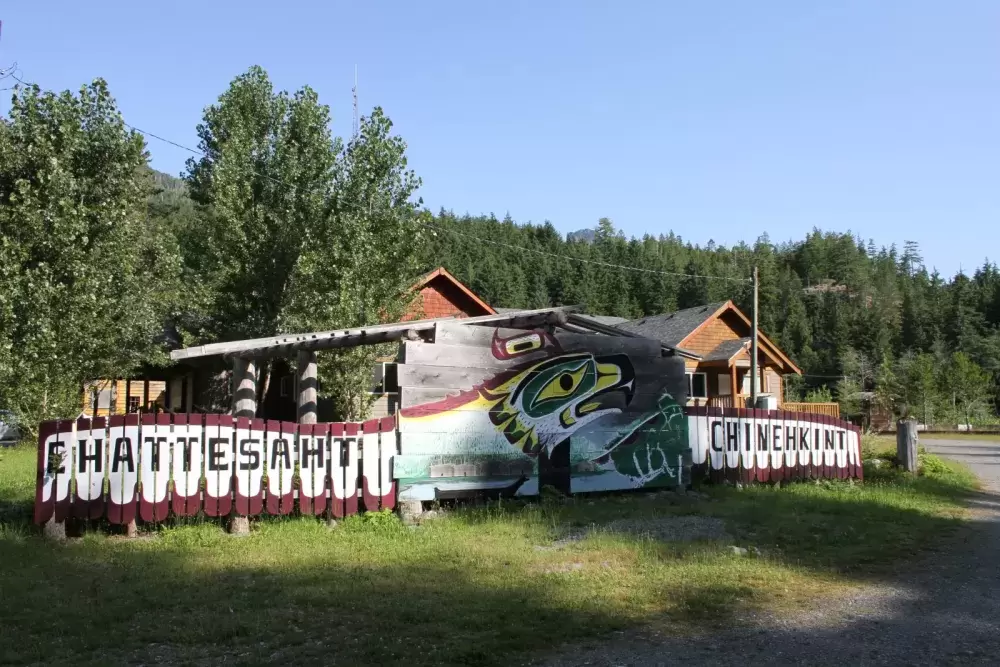The past year has been a devastating one as the Ehattesaht/Chinehkint community buried six of its young adults in separate incidents – losses resulting from substance addictions.
Chief Councillor Simon John said the Ehattesaht First Nation has declared a state of emergency hoping to catch the attention of government.
“We are in a state of crisis, our youth are dying – six of them in about a year,” said John.
Ehattesaht is a small First Nation, whose reserve community of Ehatis neighbors Zeballos, B.C. According to Nuu-chah-nulth Tribal Council records, as of November there were 551 Ehattesaht members, with over 100 of those living in Ehatis. There are about 20 to 30 youth from age 12 to about 20 living in the village, John estimates.
Everyone knows everyone so when one dies, everybody feels it,” said John. “We care and we are feeling helpless.”
The latest death was of a young woman who went home to get off the streets of Campbell River.
“She went there for work but that fell through, so she ended up on the streets,” John told Ha-Shilth-Sa.
Four years later, the young woman made her way home.
“She was trying to detox on her own and went to the clinic, but didn’t get her medicine in time,” said John, adding that it’s easy to get hooked but hard to get off drugs.
John said that he hoped to catch the attention of the media by declaring a state of emergency. He received a call from Murray Rankin, B.C.’s minister of Indigenous Relations and Reconciliation, who spoke to the chief about long-term solutions. While there were no immediate answers, John admits the talk gave him ideas to think about. They are planning to meet for another talk in the coming weeks.
“One of our key requests of Minister Rankin was to take the lead and bring all of the other ministries to the table to help with long-term solutions,” said John.
He said they are in desperate need of effective services for their members.
“Certainly, there are some cultural things we need to pay attention to, but really it comes down to consistency in access and consistency in practitioners,” John said. “Our office is getting a lot of calls from the media and people offering their services and we are wading through them all.”
Part of the problem, according to John, is being a small First Nation. By the time health care funds leave the government and trickle down through all the other agencies, there’s very little left to do anything with.
“We have outreach workers and they’re all overwhelmed,” said John.
“This is not a blame game, we just wonder how we can adjust our lives, we want to understand it, fix it and move on,” he continued. “We care and we feel helpless.”
John believes the problems stem from the loss of cultural values due to the residential school system. In the community the youth have a gym for sports, there’s community events and some cultural events. But John says a lot of the cultural values have been stripped and people are down.
“We’re still in a position of fighting for cultural values that we’ve lost. We want our people to be healthy, to have dignity – when they don’t have that they can’t function,” said John.
John said that the people have been undermined so much they lose their will to survive.
“We want to find a way to lift them up,” he added.
“We see our marginalized people, some have been on drugs since their early teens – we hope for healthy lifestyles for them,” said John. “It’s tough when you see your young ones on the streets and the next day they’re gone.”
Ehattesaht’s state of emergency was announced days after B.C. became Canada’s first province to decriminalize the possession of illicit drugs for personal use at the end of January. The provincial government announced this development in the hope of removing the stigmatization drug users face, thereby encouraging them to see treatment. As the death toll from illicit drug use has risen to the rate of six a day in B.C., the province has attempted to curb the trend through an emphasis on harm reduction approaches, like supervised injection sites and the prescription of safer alternative drugs for users who are struggling to kick their habit.
Not certain what a solution could look like, John says Ehattesaht wants to create an answer that fits the needs of their own people.
If he had all the money he wanted, he’d build a facility in Campbell River to help the people on the streets. And if he had more money, “I’d build something at home to lift up our people.”

